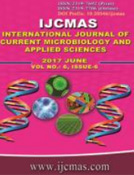


 National Academy of Agricultural Sciences (NAAS)
National Academy of Agricultural Sciences (NAAS)

|
PRINT ISSN : 2319-7692
Online ISSN : 2319-7706 Issues : 12 per year Publisher : Excellent Publishers Email : editorijcmas@gmail.com / submit@ijcmas.com Editor-in-chief: Dr.M.Prakash Index Copernicus ICV 2018: 95.39 NAAS RATING 2020: 5.38 |
Infertility is becoming a major problem among the marital couples and in at least 50% of the cases, the male partners are the only contributor to the problem. Many of these men are diagnosed with no etiology and hence they are idiopathic cases. The current study was planned to generate some markers in infertile males in order to find a preventive measure that could be taken for effective cure of this serious issue. Study conducted in two arms between the age group 18-45. Arm A composed of healthy control male having 150 volunteers and in B arm 50 infertile males. 30 volunteers from arm A having less than two inches AGD therefore finally they were included in arm B. Hence, the total infertile male in arm B was 80 males. A preliminary investigation was done by Physical examination, Anogenital Distance measurement followed by semen analysis, Lymphocyte culture to rule out chromosomal. Among the 60% of infertile + <2 inch AGD) males having Anogenital distance less than 2 inches and having abnormal sperm morphology, less sperm count, motility, viscosity, azoospermia, oligospermia. On the other hand, 70% of the total individuals revealed abnormal chromosomal pattern as compared with the healthy individuals. The study signatures with less anogenital distance and marked chromosomal abnormalities in the infertile male. Moreover, the individuals having less AGD with associated chromosomal defects will certainly identify males at high risk of infertility. This will help the unmarried male individuals get interventional therapy or may undergo another method of therapeutic modality so that the status of a healthy male partner after marriage may be achieved.
 |
 |
 |
 |
 |